Unit 8 Pets. Period 3 Grammar 课件(共24张PPT) 牛津译林版英语七年级下册
文档属性
| 名称 | Unit 8 Pets. Period 3 Grammar 课件(共24张PPT) 牛津译林版英语七年级下册 | 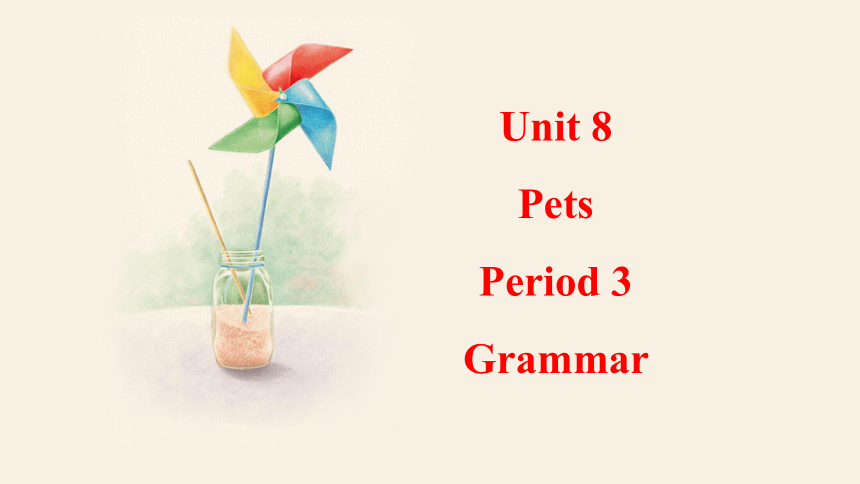 | |
| 格式 | pptx | ||
| 文件大小 | 537.4KB | ||
| 资源类型 | 教案 | ||
| 版本资源 | 牛津译林版 | ||
| 科目 | 英语 | ||
| 更新时间 | 2023-12-28 23:47:27 | ||
图片预览

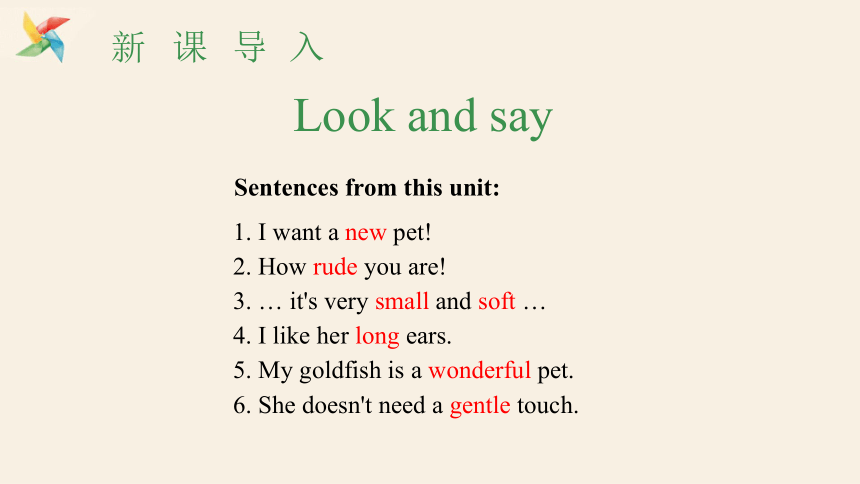

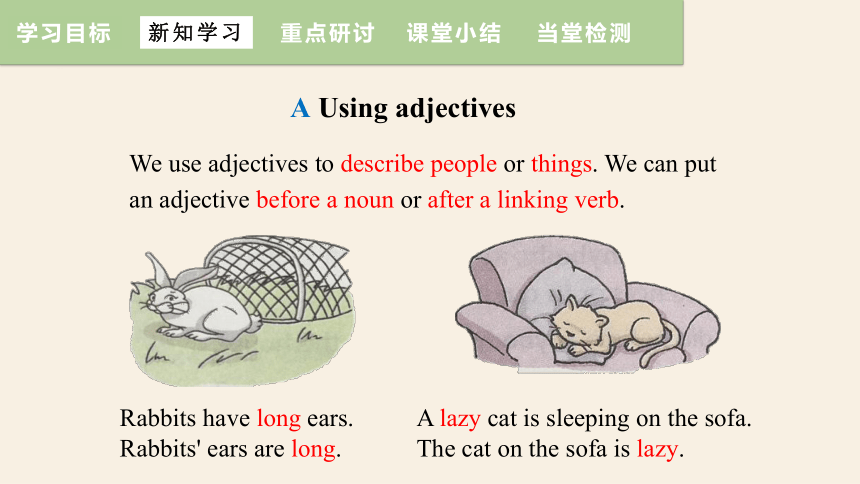
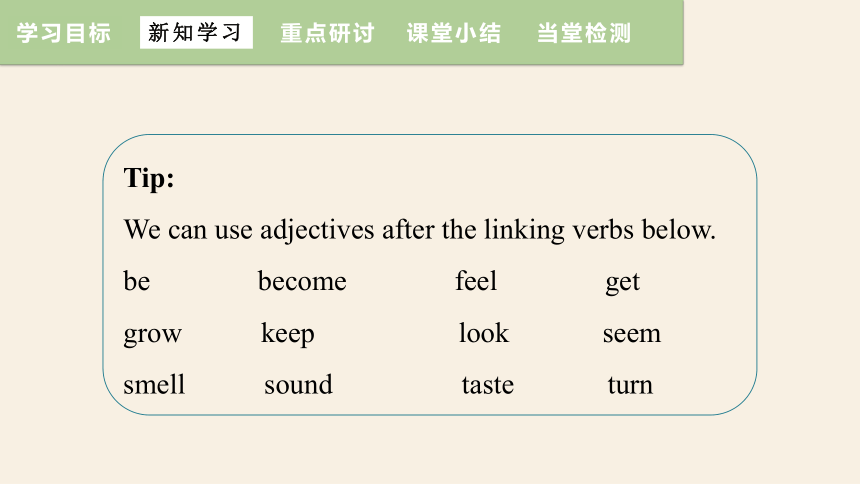
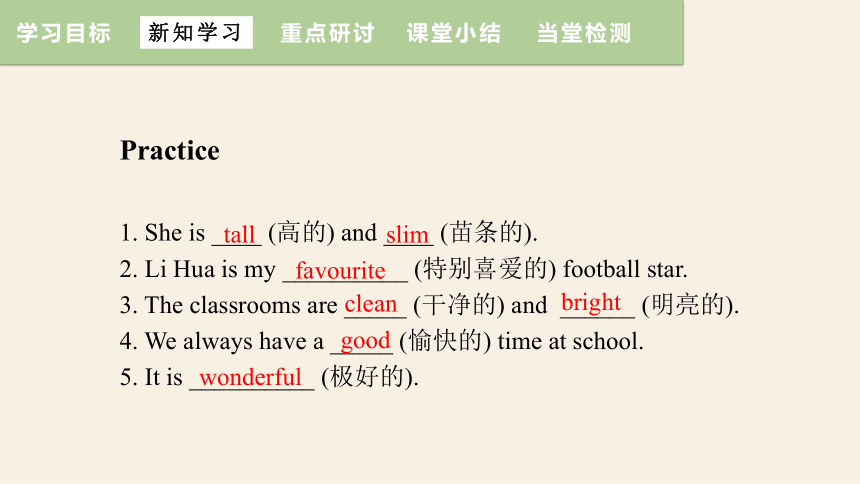
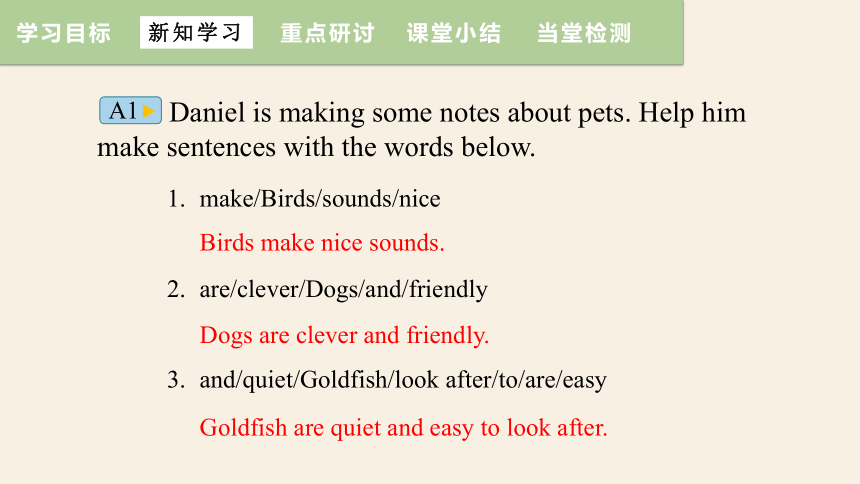
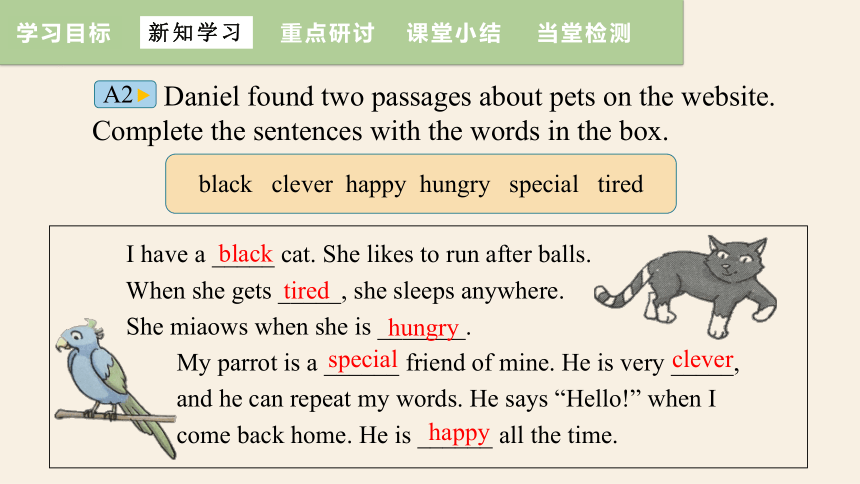
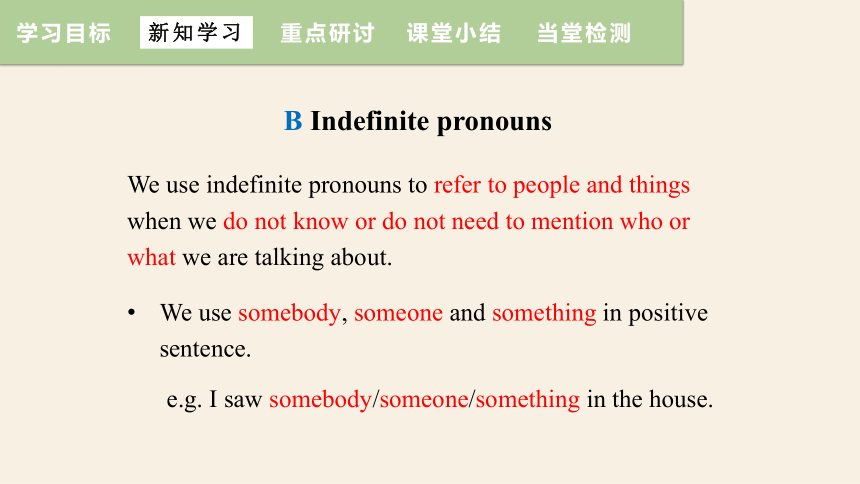
文档简介
(共24张PPT)
Unit 8
Pets
Period 3
Grammar
新
课
导
入
Look and say
Sentences from this unit:
1. I want a new pet!
2. How rude you are!
3. … it's very small and soft …
4. I like her long ears.
5. My goldfish is a wonderful pet.
6. She doesn't need a gentle touch.
Language Goal
新知学习
课堂小结
当堂检测
学习目标
重点研讨
1.能熟悉并正确运用本课时的重点单词和短语。
2.能正确使用形容词。
3.能正确使用复合不定代词。
新知学习
课堂小结
当堂检测
学习目标
重点研讨
A Using adjectives
We use adjectives to describe people or things. We can put an adjective before a noun or after a linking verb.
Rabbits have long ears.
Rabbits' ears are long.
A lazy cat is sleeping on the sofa.
The cat on the sofa is lazy.
新知学习
课堂小结
当堂检测
学习目标
重点研讨
Tip:
We can use adjectives after the linking verbs below.
be become feel get grow keep look seem smell sound taste turn
新知学习
课堂小结
当堂检测
学习目标
重点研讨
1. She is ____ (高的) and ____ (苗条的).
2. Li Hua is my __________ (特别喜爱的) football star.
3. The classrooms are _____ (干净的) and ______ (明亮的).
4. We always have a _____ (愉快的) time at school.
5. It is __________ (极好的).
Practice
tall
slim
favourite
clean
bright
good
wonderful
Daniel is making some notes about pets. Help him make sentences with the words below.
新知学习
课堂小结
当堂检测
学习目标
重点研讨
A1
▲
make/Birds/sounds/nice
are/clever/Dogs/and/friendly
and/quiet/Goldfish/look after/to/are/easy
Birds make nice sounds.
Dogs are clever and friendly.
Goldfish are quiet and easy to look after.
新知学习
课堂小结
当堂检测
学习目标
重点研讨
Daniel found two passages about pets on the plete the sentences with the words in the box.
A2
▲
black clever happy hungry special tired
I have a _____ cat. She likes to run after balls.
When she gets _____, she sleeps anywhere.
She miaows when she is _______.
My parrot is a ______ friend of mine. He is very _____,
and he can repeat my words. He says “Hello!” when I
come back home. He is ______ all the time.
black
tired
hungry
special
clever
happy
新知学习
课堂小结
当堂检测
学习目标
重点研讨
B Indefinite pronouns
We use indefinite pronouns to refer to people and things when we do not know or do not need to mention who or what we are talking about.
We use somebody, someone and something in positive sentence.
e.g. I saw somebody/someone/something in the house.
新知学习
课堂小结
当堂检测
学习目标
重点研讨
We use anybody, anyone and anything in negative sentence or in questions.
e.g. I did not see anybody/anyone/anything in the house.
Did you see anybody/anyone/anything in the house
Tip:
When we are offering something or when we expect the answer to be “yes”, we can use something/somebody/someone in questions.
e.g. Would you like something to eat
Is someone there
新知学习
课堂小结
当堂检测
学习目标
重点研讨
We use nobody, no one and nothing to refer to “not anyone” and “not anything”.
e.g. There is nobody/no one/nothing in the house.
Tips:
I did not hear anybody.=I heard nobody.
No one is written as two words.
新知学习
课堂小结
当堂检测
学习目标
重点研讨
We use everybody, everyone and everything to refer to “all people” and “all things”.
e.g. Is everybody/everyone here today.
Everything is ready.
新知学习
课堂小结
当堂检测
学习目标
重点研讨
Practice
1. —What a big box! Can I help you
—No, thanks. There's _______ in it. It's empty(空的).
nothing
2. —There's _________ wrong with my clock. It doesn't work.
—Don't worry. Let me have a look.
3. —______________ is in the classroom. Where are they
—They are all on the playground.
4. —How easy the maths exam was!
— Yes. But I don't think ________ could pass it.
something
No one/Nobody
everyone
新知学习
课堂小结
当堂检测
学习目标
重点研讨
Mr Wu is asking the students about their plete their conversation with the correct indefinite pronouns.
▲
Mr Wu: Millie, I know you have a dog. What do you feed him
Millie: We usually give him dog food.
Mr Wu: Do you feed him (1)______________ else
Millie: Yes. Sometimes we give him some meat. He likes it.
Mr Wu: I see. Does (2) _______________ have a cat
Amy: Yes, I have a cat. She's nice to (3)__________________.
Mr Wu: Good. I know (4)_________________ has goldfish, right
Peter: Yes, I do. Goldfish are easy to look after.
Mr Wu: That's true. Does (5)__________________ have a snake
Kitty: No. (6)_________________wants a snake, I think.
Daniel: I don't agree. There's (7)____________________wrong
with keeping a snake if you like it.
anything
anybody/anyone
everyone/everybody
somebody/someone
anybody/anyone
Nobody/No one
nothing
新知学习
课堂小结
当堂检测
学习目标
重点研讨
形容词
1. 定义
形容词是用来描写或修饰名词或代词,说
明人或事物的特征或性质的,译为“……的”。
2. 用法
作定语:
e.g. This is an old house. 这是一间老宅子。
作表语:
e.g. He is very clever. 他很聪明。
新知学习
课堂小结
当堂检测
学习目标
重点研讨
3. 在句中的位置
1) 形容词作定语通常置于被修饰词之前,但
当被修饰的词是复合不定代词时,则置于
复合不定代词之后。
e.g. something interesting, interesting books
2) 形容词作表语位于系动词之后。除be动词
外,系动词还包括become、feel、get、
look、seem、smell、sound、taste、turn等。
e.g. The food tastes good.
新知学习
课堂小结
当堂检测
学习目标
重点研讨
不定代词
代替或修饰不特指的人或事物的代词叫不定代词。常见的不定代词有:some, any, no, every, all, each, both, much, many, (a) little, (a) few, other(s), another, none, one, either, neither等。
新知学习
课堂小结
当堂检测
学习目标
重点研讨
指人:
somebody、someone 某人
anybody、anyone 某人
everybody、everyone 每个人
nobody、no one 没有人
some, any, every, no都能和one, body, thing一起构成代词,这些代词叫复合不定代词。
指物:
something 某物
anything 某物
everything 每件事,一切
nothing 没事,什么也没有
新知学习
课堂小结
当堂检测
学习目标
重点研讨
复合不定代词用法
somebody, something, someone
常用于肯定句中;疑问句中,如果提供某物或者希望得到对方肯定的回答,也会用some-。
如:Hey, Lily. There is someone outside the door.
嗨,丽丽,门外有人。
anything, anybody, anyone
常用于疑问句或否定句中。
如:Did you meet anyone when you came to school
last Sunday
上个星期天你来学校时见到什么人了吗
新知学习
课堂小结
当堂检测
学习目标
重点研讨
no one, nobody, nothing
no-有否定含义,no one表示“没有人”,这两个单词要分开写,nobody = not anyone, nothing = not anything
如:He has nothing much to do today.
他今天没有多少事情做。
everybody, everyone, everything
everybody/everyone的意思是“每个人,人人”,everything的意思是“每件事,一切”。
如:Everybody likes swimming.
每个人都喜欢游泳。
新知学习
课堂小结
当堂检测
学习目标
重点研讨
形容词修饰复合不定代词时,通常要位于这些词的后面。
如:Is there anything important in today's newspaper
今天的报纸上有什么重要的新闻吗?
复合不定代词作主语时,谓语动词通常用单数。
如:Everything is ready.
一切都准备好了。
Everybody likes to join in this activity.
每个人都愿意参加这一活动。
新知学习
重点研讨
课堂小结
当堂检测
学习目标
Unit 8
Period 3
形容词:
形容词作_______和_______,当修饰复合不定代词时,放在复合不定代词_______。
复合不定代词:
somebody, something, someone 用于___________,anything, anybody, anyone用于_________或疑问句。
定语
表语
后面
肯定句
否定句
新知学习
课堂小结
当堂检测
学习目标
重点研讨
一、根据句意及提示用形容词完成下列句子。
1. Sometimes, I feel ______ (饿的) between
meals, so I eat an apple or a pear.
2. Yes, they're very ______ (漂亮的).
3. I like her _____ (长的) ears.
4. My goldfish is a _________ (极好的) pet.
5. She doesn't need a _____ (温柔的) touch.
hungry
pretty
long
wonderful
gentle
新知学习
课堂小结
当堂检测
学习目标
重点研讨
二、根据句意及提示用适当的复合不定代词完成下列句子。
1. Hello, e________________!
2. I can tell s______________ about Millie and
her classmates.
3. … she's going to ask s_______________ to fix it.
4. Can you find a____________ to help you with
your homework
5. There's s_________ wrong with my computer.
veryone/verybody
omething
omeone/omebody
nyone/nybody
omething
Unit 8
Pets
Period 3
Grammar
新
课
导
入
Look and say
Sentences from this unit:
1. I want a new pet!
2. How rude you are!
3. … it's very small and soft …
4. I like her long ears.
5. My goldfish is a wonderful pet.
6. She doesn't need a gentle touch.
Language Goal
新知学习
课堂小结
当堂检测
学习目标
重点研讨
1.能熟悉并正确运用本课时的重点单词和短语。
2.能正确使用形容词。
3.能正确使用复合不定代词。
新知学习
课堂小结
当堂检测
学习目标
重点研讨
A Using adjectives
We use adjectives to describe people or things. We can put an adjective before a noun or after a linking verb.
Rabbits have long ears.
Rabbits' ears are long.
A lazy cat is sleeping on the sofa.
The cat on the sofa is lazy.
新知学习
课堂小结
当堂检测
学习目标
重点研讨
Tip:
We can use adjectives after the linking verbs below.
be become feel get grow keep look seem smell sound taste turn
新知学习
课堂小结
当堂检测
学习目标
重点研讨
1. She is ____ (高的) and ____ (苗条的).
2. Li Hua is my __________ (特别喜爱的) football star.
3. The classrooms are _____ (干净的) and ______ (明亮的).
4. We always have a _____ (愉快的) time at school.
5. It is __________ (极好的).
Practice
tall
slim
favourite
clean
bright
good
wonderful
Daniel is making some notes about pets. Help him make sentences with the words below.
新知学习
课堂小结
当堂检测
学习目标
重点研讨
A1
▲
make/Birds/sounds/nice
are/clever/Dogs/and/friendly
and/quiet/Goldfish/look after/to/are/easy
Birds make nice sounds.
Dogs are clever and friendly.
Goldfish are quiet and easy to look after.
新知学习
课堂小结
当堂检测
学习目标
重点研讨
Daniel found two passages about pets on the plete the sentences with the words in the box.
A2
▲
black clever happy hungry special tired
I have a _____ cat. She likes to run after balls.
When she gets _____, she sleeps anywhere.
She miaows when she is _______.
My parrot is a ______ friend of mine. He is very _____,
and he can repeat my words. He says “Hello!” when I
come back home. He is ______ all the time.
black
tired
hungry
special
clever
happy
新知学习
课堂小结
当堂检测
学习目标
重点研讨
B Indefinite pronouns
We use indefinite pronouns to refer to people and things when we do not know or do not need to mention who or what we are talking about.
We use somebody, someone and something in positive sentence.
e.g. I saw somebody/someone/something in the house.
新知学习
课堂小结
当堂检测
学习目标
重点研讨
We use anybody, anyone and anything in negative sentence or in questions.
e.g. I did not see anybody/anyone/anything in the house.
Did you see anybody/anyone/anything in the house
Tip:
When we are offering something or when we expect the answer to be “yes”, we can use something/somebody/someone in questions.
e.g. Would you like something to eat
Is someone there
新知学习
课堂小结
当堂检测
学习目标
重点研讨
We use nobody, no one and nothing to refer to “not anyone” and “not anything”.
e.g. There is nobody/no one/nothing in the house.
Tips:
I did not hear anybody.=I heard nobody.
No one is written as two words.
新知学习
课堂小结
当堂检测
学习目标
重点研讨
We use everybody, everyone and everything to refer to “all people” and “all things”.
e.g. Is everybody/everyone here today.
Everything is ready.
新知学习
课堂小结
当堂检测
学习目标
重点研讨
Practice
1. —What a big box! Can I help you
—No, thanks. There's _______ in it. It's empty(空的).
nothing
2. —There's _________ wrong with my clock. It doesn't work.
—Don't worry. Let me have a look.
3. —______________ is in the classroom. Where are they
—They are all on the playground.
4. —How easy the maths exam was!
— Yes. But I don't think ________ could pass it.
something
No one/Nobody
everyone
新知学习
课堂小结
当堂检测
学习目标
重点研讨
Mr Wu is asking the students about their plete their conversation with the correct indefinite pronouns.
▲
Mr Wu: Millie, I know you have a dog. What do you feed him
Millie: We usually give him dog food.
Mr Wu: Do you feed him (1)______________ else
Millie: Yes. Sometimes we give him some meat. He likes it.
Mr Wu: I see. Does (2) _______________ have a cat
Amy: Yes, I have a cat. She's nice to (3)__________________.
Mr Wu: Good. I know (4)_________________ has goldfish, right
Peter: Yes, I do. Goldfish are easy to look after.
Mr Wu: That's true. Does (5)__________________ have a snake
Kitty: No. (6)_________________wants a snake, I think.
Daniel: I don't agree. There's (7)____________________wrong
with keeping a snake if you like it.
anything
anybody/anyone
everyone/everybody
somebody/someone
anybody/anyone
Nobody/No one
nothing
新知学习
课堂小结
当堂检测
学习目标
重点研讨
形容词
1. 定义
形容词是用来描写或修饰名词或代词,说
明人或事物的特征或性质的,译为“……的”。
2. 用法
作定语:
e.g. This is an old house. 这是一间老宅子。
作表语:
e.g. He is very clever. 他很聪明。
新知学习
课堂小结
当堂检测
学习目标
重点研讨
3. 在句中的位置
1) 形容词作定语通常置于被修饰词之前,但
当被修饰的词是复合不定代词时,则置于
复合不定代词之后。
e.g. something interesting, interesting books
2) 形容词作表语位于系动词之后。除be动词
外,系动词还包括become、feel、get、
look、seem、smell、sound、taste、turn等。
e.g. The food tastes good.
新知学习
课堂小结
当堂检测
学习目标
重点研讨
不定代词
代替或修饰不特指的人或事物的代词叫不定代词。常见的不定代词有:some, any, no, every, all, each, both, much, many, (a) little, (a) few, other(s), another, none, one, either, neither等。
新知学习
课堂小结
当堂检测
学习目标
重点研讨
指人:
somebody、someone 某人
anybody、anyone 某人
everybody、everyone 每个人
nobody、no one 没有人
some, any, every, no都能和one, body, thing一起构成代词,这些代词叫复合不定代词。
指物:
something 某物
anything 某物
everything 每件事,一切
nothing 没事,什么也没有
新知学习
课堂小结
当堂检测
学习目标
重点研讨
复合不定代词用法
somebody, something, someone
常用于肯定句中;疑问句中,如果提供某物或者希望得到对方肯定的回答,也会用some-。
如:Hey, Lily. There is someone outside the door.
嗨,丽丽,门外有人。
anything, anybody, anyone
常用于疑问句或否定句中。
如:Did you meet anyone when you came to school
last Sunday
上个星期天你来学校时见到什么人了吗
新知学习
课堂小结
当堂检测
学习目标
重点研讨
no one, nobody, nothing
no-有否定含义,no one表示“没有人”,这两个单词要分开写,nobody = not anyone, nothing = not anything
如:He has nothing much to do today.
他今天没有多少事情做。
everybody, everyone, everything
everybody/everyone的意思是“每个人,人人”,everything的意思是“每件事,一切”。
如:Everybody likes swimming.
每个人都喜欢游泳。
新知学习
课堂小结
当堂检测
学习目标
重点研讨
形容词修饰复合不定代词时,通常要位于这些词的后面。
如:Is there anything important in today's newspaper
今天的报纸上有什么重要的新闻吗?
复合不定代词作主语时,谓语动词通常用单数。
如:Everything is ready.
一切都准备好了。
Everybody likes to join in this activity.
每个人都愿意参加这一活动。
新知学习
重点研讨
课堂小结
当堂检测
学习目标
Unit 8
Period 3
形容词:
形容词作_______和_______,当修饰复合不定代词时,放在复合不定代词_______。
复合不定代词:
somebody, something, someone 用于___________,anything, anybody, anyone用于_________或疑问句。
定语
表语
后面
肯定句
否定句
新知学习
课堂小结
当堂检测
学习目标
重点研讨
一、根据句意及提示用形容词完成下列句子。
1. Sometimes, I feel ______ (饿的) between
meals, so I eat an apple or a pear.
2. Yes, they're very ______ (漂亮的).
3. I like her _____ (长的) ears.
4. My goldfish is a _________ (极好的) pet.
5. She doesn't need a _____ (温柔的) touch.
hungry
pretty
long
wonderful
gentle
新知学习
课堂小结
当堂检测
学习目标
重点研讨
二、根据句意及提示用适当的复合不定代词完成下列句子。
1. Hello, e________________!
2. I can tell s______________ about Millie and
her classmates.
3. … she's going to ask s_______________ to fix it.
4. Can you find a____________ to help you with
your homework
5. There's s_________ wrong with my computer.
veryone/verybody
omething
omeone/omebody
nyone/nybody
omething
